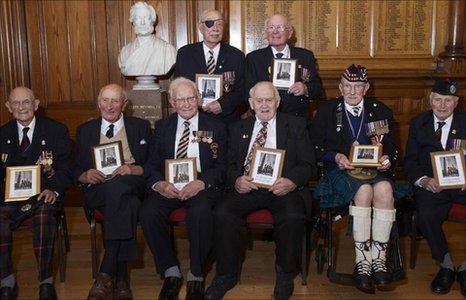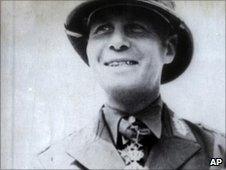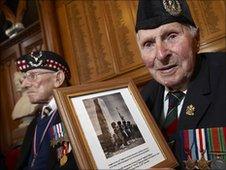Pain of capture at St Valery-en-Caux recalled
- Published

St Valery veterans at the civic reception hosted by Highland Council
Old soldiers who saw action in France after hundreds of thousands of Allied troops were evacuated at Dunkirk were honoured at a civic reception in Inverness this week.
The veterans had served with the 51st Highland Division, which recruited from communities across the Highlands and Islands.
On 12 June 1940, about 10,000 men of the division were captured at St Valery-en-Caux along with thousands of French soldiers.
Here, BBC Scotland reporter Iain MacDonald tells the stories of some of those taken and force marched to prisoner of war (PoW) camps.
Alec Wiseman is sitting in his sister's front room in a house above Inverness city centre.
His eyes are on the middle distance and his lips form the words: "Los, los...left…left…left, right, left."
Alec's body is in the year 2010, but his mind is back in France 70 years ago marching to Poland under German armed guard.
Just over 14-years-old, he joined up by lying about his age.
On the outbreak of war, he was a corporal and a champion bugler. "Good at the blowing," he says. "Still am."
Historians increasingly concede that the "Forgotten 51st" was deliberately left behind as a third of a million were brought out at Dunkirk.

Erwin Rommel took the surrender at St Valery-en-Caux
They were left not just because they had been fighting further along the coast, but because Winston Churchill was being accused of running out on the French.
As government spin was deployed to making Dunkirk a triumph, so British people were not told about the men left behind. Alec Wiseman was one of those.
Today, dementia has claimed much of Alec's memory. But his recollection of those June days are still sharp.
He recalls that final rearguard action alongside the remnants of the French army, fighting and running and fighting again till it ended at the coastal town of St Valery-en-Caux.
Colleagues of Alec have told how it became an "outpost of hell" as shells and bombs and mortars fell in and around the buildings on the cliffs above the beach.
Alec says it was like the end of the world.
Some soldiers lowered themselves down the cliffs by tying together rifle slings and blankets and anything else they could find to make ropes.
On the beach they hoped to find boats coming, like they had at Dunkirk, to take them home. But, politicians and military staff aside, Britain didn't know they were there.
There was no armada of little boats this time.
Others jumped from the cliffs and took their own lives convinced by propaganda that they would be shown no mercy if they surrendered.
Threw food
When the French commanders decided to surrender, the 51st were captured and their commander, the ironically named General Victor Fortune, handed his sword to a German general, Erwin Rommel, who would go on to become nicknamed the Desert Fox.
The captured soldiers marched to PoW camps in eastern Europe.
Alec's sister Frances says French civilians turned out by the roadside and threw food.
He was upset, she says, when the Germans gave him a greatcoat and he realised it was full of holes. Somebody had been shot in it before him, but he wore it.
Alec was eventually invalided home and immediately tried to join up again, though this time he applied to the RAF, reckoning it was a safer proposition than the infantry.
They turned him down, and the only job he could get was sweeping the streets.

The 51st Highland Division returned to St Valery as liberators
But many of his colleagues were still in camps as the war drew to a close. The Russians were closing in from the east. Their guards marched them west.
Ahead of them were Jewish prisoners from Auschwitz heading in the same direction.
Peter Black, another veteran, remembers that if a Jew fell out of the line, a German guard would offer him the chance to get up before shooting him.
In the end the Scots were surrendered to the Allies in Bavaria.
There are happier stories associated with St Valery and the 51st.
Tommy Fraser managed to escape a holding camp, stole a bicycle and escaped to Spain.
Arthur Fraser escaped from the first march and was helped to safety by the daughter of a Scots exile. After the war she married him and they lived in Inverness, where they had a daughter called Valery.
After St Valery, the 51st Highland Division was reconstituted and fought at El Alamein in Africa and defeated Rommel and his troops.
In 1944, they marched into St Valery-en-Caux, as liberators. It was believed that decision was made by Churchill.
- Published28 May 2010